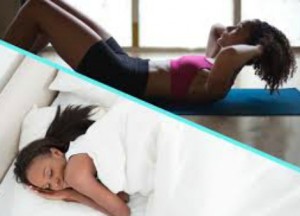 Exercises like walking, yoga, and even gardening can help people get enough sleep at night. Researchers from the Perelman School of Medicine at the University of Pennsylvania investigated whether physical activity can impact sleep quality. The results indicate that many physical activities are associated with quality sleeping. However, some activities, like childcare, are associated with poor sleep habits.
Exercises like walking, yoga, and even gardening can help people get enough sleep at night. Researchers from the Perelman School of Medicine at the University of Pennsylvania investigated whether physical activity can impact sleep quality. The results indicate that many physical activities are associated with quality sleeping. However, some activities, like childcare, are associated with poor sleep habits.
The study surveyed the sleep habits and physical activities of 429,110 adults involved in the 2013 Behavioral Risk Factor Surveillance System. The survey respondents reported what type of physical activity they did the most in the past month and how much they slept in a typical 24-hour period. The researchers then evaluated whether people who reported doing certain types of activities were more likely to report a sufficient amount of sleep of seven or more hours. They analyzed how doing physical activities compared to not doing physical activity and to only walking. The results were adjusted for age, sex, education level, and body mass index.
Walking was correlated to fewer cases of insufficient sleep compared to no activity. Aerobics, biking, gardening, golfing, running, weight-lifting, and yoga were all associated with better sleep habits compared to no activity and compared to walking. Other activities like housekeeping and childcare were linked to more cases of poor sleep habits.
“Not only does this study show that those who get exercise simply by walking are more likely to have better sleep habits, but these effects are even stronger for more purposeful activities, such as running and yoga, and even gardening and golf. It was also interesting that people who receive most of their activity from housework and childcare were more likely to experience insufficient sleep,” explained study leader Michael Gardener, Ph.D., instructor in psychiatry.
The results indicate that people looking to improve their sleep quality should make exercise a part of their regular schedule.
This research was presented at SLEEP 2015, the annual meeting of the Associated Professional Sleep Societies.
Previous news in sleep:

